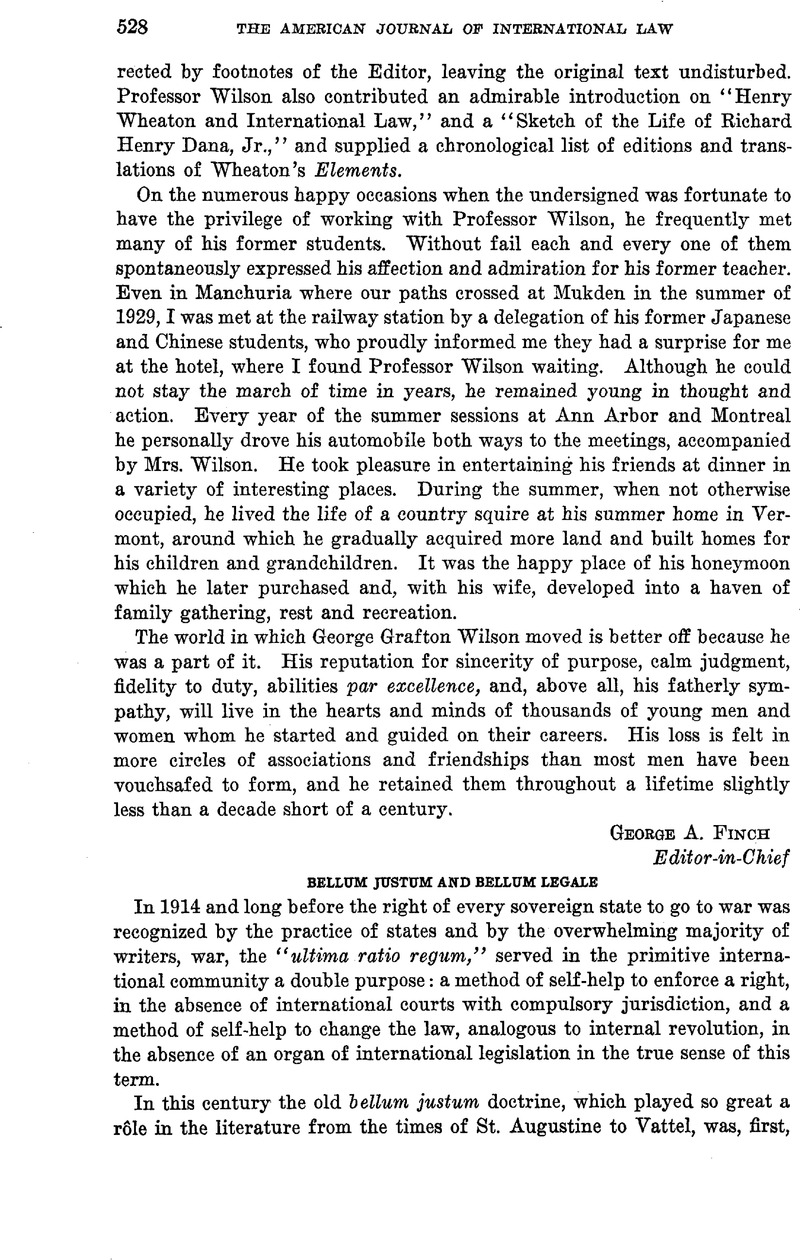Article contents
Bellum Justum and Bellum Legale
Published online by Cambridge University Press: 20 April 2017
Abstract

- Type
- Editorial Comment
- Information
- Copyright
- Copyright © American Society of International Law 1951
References
1 See, apart from monographs on St. Augustine, St. Thomas, Victoria, Suárez, Gentili,Grotius and others, the following works: A. Vanderpol, Le droit de la guerre juste d'après les théologiens et les canonistes du Moyen-Âge (1911); idem, La doctrine scholastique du droit de la guerre (1919) ; G. Salvioli, Il concetto della guerra giusta negli scrittori anteriori a Grotius (1915) ; P. Yves de la Brière, “Les droits de la juste victoire selon la tradition des théologiens catholiques,” Revue Générale de Droit International Public, Vol. XXXII (1925); idem, “Les étapes de la tradition théologique concernant le droit de la guerre juste, ibid., 1937, pp. 129 ft.; idem, Le droit de juste guerre (Paris,1938); V. Beaufort, La guerre comme instrument de secours ou de punition (The Hague,1933); Regout, La doctrine de la guerre juste de St. Augustin à nos jours d’après les théologiens et canonistes catholiques (1935); Kipp, Moderne Probleme des Kriegsrechts in der Spätscholastik (1935) ; J. von Elbe, “ The Evolution of the Concept of Just War in International Law,” this JOURNAL, Vol. 33 (1939), pp. 665-688.
2 “Guerre juste et juste paic,” Revue Générale de Droit International Public, Vol. XXVI (1919), pp. 9-75, 268-309, 349-405.
3 Der Krieg und die Völkerrechtsordnung (Vienna, 1919).
4 H. Kelsen, General Theory of Law and State (1945), pp. 331-338. He is followed by P. Guggenheim, Lehrbuch des Völkerrechts, Vol. I, pp. 590-593.
5 Naturally, an ethical and political critique of a concrete war has always existed; the ethical critique of the positive law, whether municipal or international, is socially indispensable. For, as the Romans said, Non omne quod licet, honestum.
6 See also A. Nussbaum, “ Just War—a Legal Concept?” Michigan Law Review, Vol. 42 (1943-44), pp. 453-479.
7 Thus Victoria: “Unica est et sola causa justa inferendi bellum injuria accepta”;Grotius: “Causa justi belli suscipiendi nulla alia esse potest nisi injuria.”
8 Thus, e.g., Cayetano: “Habens justum bellum gerit personam judicis criminaliter procedentis.”
9 One belligerent can have a just cause, whereas the other has a “still more just ” cause.
10 Thus G. Schwarzenberger, “Jus Pacis ac Belli,” this JOURNAL, Vol. 37 (1943), pp. 46-77, at p. 465.
11 See Antonio Truyol y Serra, “Crimenes de guerra y derecho natural,” Revista Española de Derecho Internacional, Vol. I, No. 1 (1948), pp. 45-73.
12 Ibid., at p. 60.
13 See Verdross, op. cit.; Alf Ross, Constitution of the United Nations (New York,1950), pp. 140-141; W. Schätzel, ”Friede und Gerechtigkeit,” Die Friedenswarte, Vol.50, No. 2 (1950), pp. 97-107.
14 This essential distinction is pointed out in Josef L. Kunz, Kriegsrecht und Neutralitätsrecht(Vienna, 1935), p. 2, note 3, and in A. Verdross, Völkerrecht (Vienna,1950), p. 339.
15 H. Kelsen, The Law of the United Nations (London, 1950), pp. 732-739; Alf Ross, op. cit., p. 141.
16 See Robert W. Tucker, “The Interpretation of War,” The International Law Quarterly (London), Vol. 4, No. 1 (1951), pp. 11-38.
- 21
- Cited by


